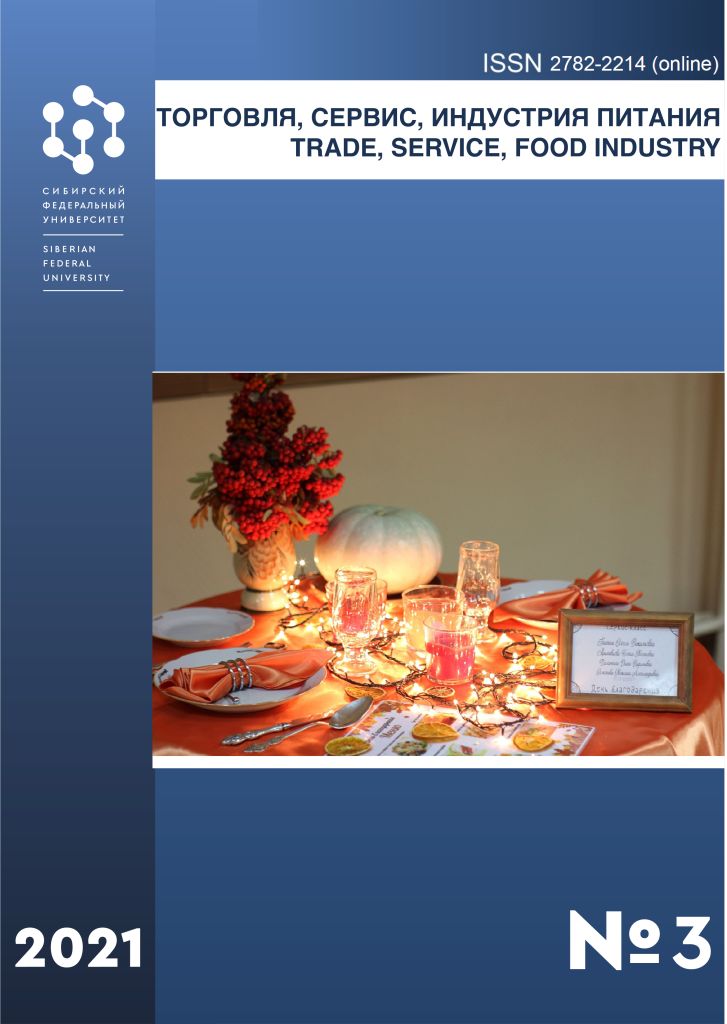Krasnoyarsk, Russian Federation
Krasnoyarsk, Russian Federation
UDC 33
CSCSTI 06.71
Russian Classification of Professions by Education 38.02.04
Russian Library and Bibliographic Classification 654
Russian Trade and Bibliographic Classification 7832
BISAC BUS073000 Commerce
The formation and development of the economic system of society on a macro scale is more and more exposed to the technocratic thinking of a person, which contributes to the emergence of periodic cyclical fluctuations of crisis phenomena that require optimization of management in order to ensure the stability and efficiency of the functioning of the entire macrosystem. The crisis phenomena that have developed in the past few years have especially adversely affected the service sector, which is an indicator of the well-being of society, creating products with an increased degree of elasticity (sensitivity) to changes in demand in the service market, the primary purpose of which is to ensure the growth of comfortable and safe human life and society. The article actualizes the considered problem of ensuring sustainable development at the macro level, the most vulnerable in the crisis in the economic sphere - the service sector. The author conducts a dynamic analysis of the share of value added in the service sector from GDP and its dynamics over several decades, determining volatility by the highest, average and highest values, and also considers the place of Russia in terms of this indicator in the classification of countries of the world community. The ongoing changes in the economies of world countries and Russia determine new types of transformations based on new knowledge, competencies and technologies at all levels of functioning of the macroenvironment and its elements. Based on the analysis of the development of the service sector in a crisis, the author proposes a mechanism that increases the sustainability of the service sector in the ecosystem of the global economy.
service sector, macro environment, macro indicators, sustainable development mechanism, crisis, economic ecosystem, integration of services
1. Alekseev, S. B. (2015). Formation and choice of strategic goals of a trading enterprise based on its external strategic potential. Trade and Economic Journal. 2(4). 285-302.
2. Archakova, S. Yu. (2019). Management of the innovation environment in the digital economy. Dissertation on the Higher Attestation Commission of the Russian Federation 08.00.05, Candidate of Economic Sciences. Voronezh. 185 p.
3. Vyatkina, I. V. (2021). The concept of forming a safe business environment and the mechanisms of its implementation. Dissertation on the Higher Attestation Commission of the Russian Federation 08.00.05, Doctor of Economics. Moscow. 495 p.
4. Gerasimova, E. A. (2016). Strategic stability of entrepreneurial structures based on network interaction. Problems of modern economics. 2(58). 114-117.
5. GOST R ISO 9001-2015. Quality management Systems. Moscow. Standartinform, 2020 [Electronic resource]. Access mode: https://www.kpms.ru/Standart/ISO9001_2015_P4_guidance.htm (accessed: 25.09.2021).
6. Deming, E. (2012). Getting out of the crisis: A new paradigm of managing people, systems and processes. Moscow: Alpina Publisher. 419.
7. The share of the service sector - The classification of countries [Electronic resource]. Access mode: https://ru.theglobaleconomy.com/rankings/Share_of_services/ (accessed: 25.09.2021).
8. Dudin, M. N. & Lyasnikov, N. V. (2009). Ensuring strategic sustainability of entrepreneurial structures in the conditions of economic crisis. Entrepreneur's Guide. IV-V. Moscow. 82-83.
9. Krymov, S. M. & Kolgan, M. V. (2017). Features of modern approaches to the organization of the system of strategic development of trade enterprises. Innovative economy: prospects for development and improvement. 3(21). 43-47.
10. Kuimov, V. V., Suslova, Yu. Yu. & Shcherbenko, E. V. (2019). Cooperative-network interactions as a resource of self-organization and achievement of qualitative results. Moscow: INFRA-M. 224.
11. Mirza, D. D. & Mirza, Z. M. (2016). Features of adaptation of the activities of network organizations of the trade sphere to changing environmental conditions. Bulletin of the Adygea State University. Series 5: Economics. 3(185). 149-155.
12. Moore, D. A. (2018). Inside the tornado. Strategies of development, success and survival in hyper-growing markets. Moscow: Stockholm School of Economics. 619.
13. Novikova, S. I. (2018). Application of a systematic approach to the study of cooperative-network interactions of organizations, and assessment of their quality. Russian entrepreneurship. 19(10). 3103-3118.
14. Federal State Statistics Service [Electronic resource]: Federal State Statistics Service. Krasnoyarsk Territory. Access mode: https://www.gks.ru/bgd/free/B04_03/IssWWW.exe/Stg/d02/18.htm. (accessed: 25.09.2021).
15. Wheeler, D. & Chambers, D. (2016). Statistical process management. Optimization of business using Shuhart control cards. Moscow: Alpina Publisher. 410.
16. Chaplina, A. N. & Gerasimova, E. A. (2021). Methodology of analysis and assessment of the level of strategic stability of network trade organizations. Problems of modern economics. 2(22).
17. Ecosystems: approaches to regulation. A report for public consultation. The Central Bank of the Russian Federation. Moscow, 2021[Electronic resource]. Access mode: https://cbr.ru/Content/Document/File/119960/Consultation_Paper_02042021.pdf (accessed: 25.09.2021).
18. Bertalanffy, L. von. (1962). General System Theory - A Critical Review. General Systems. VII. 1-20.
19. Ashby, W. R. (1947). Principles of the Self-Organizing Dynamic System. Journal of General Psychology. 37. 125-128.
20. Chaplina, A. N. & Gerasimova, E. A. (2021). Tools for ensuring the strategic sustainability of network trade organizations. Trade, service, food industry. 1(2). 201-216.








